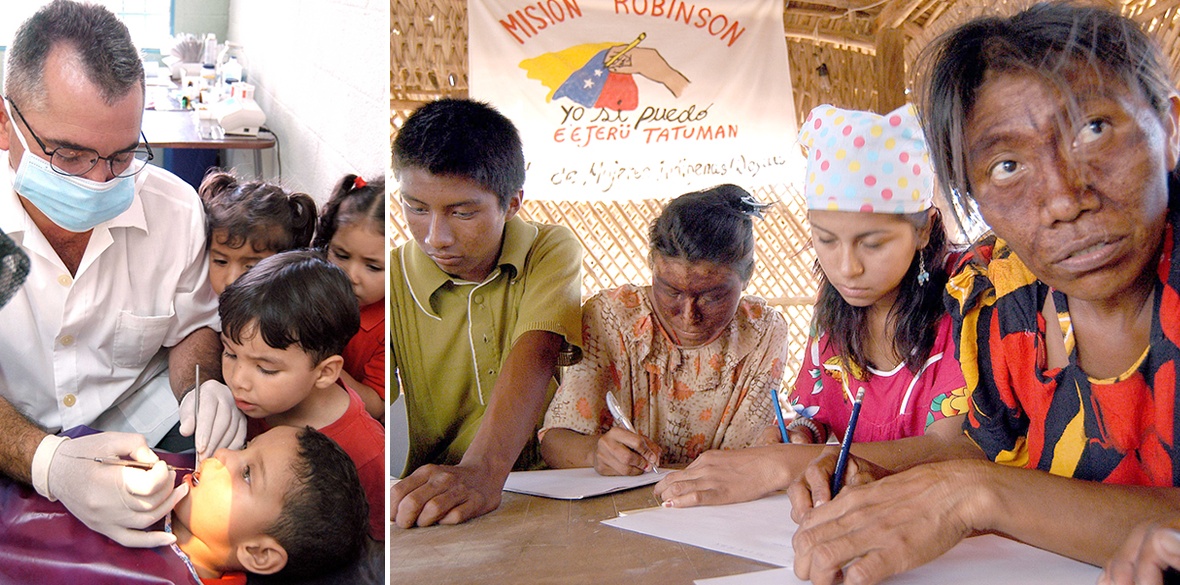This is the last article you can read this month
You can read more article this month
You can read more articles this month
Sorry your limit is up for this month
Reset on:
Please help support the Morning Star by subscribing here
I HAVE written in the Morning Star before on when Hugo Chavez visited London and my later visit to Venezuela.
Now — at this time of great neoliberal crisis, the decline of the US empire and a new “left wave” in Latin America, the upcoming 25th anniversary of his first election towards the end of the year is an opportunity for both the left and Latin America solidarity campaigners to again reflect on his continuing relevance and significance today.
When he died tragically of cancer at only 58 years of age, it was shortly after he won yet another landslide victory in being re-elected in October 2012, having first been elected at the end of 1998.
In itself, continually winning these elections was a remarkable achievement – including in 2006, when Chavez won re-election with a sensational and overwhelming margin of 63 per cent of the vote – and especially when you consider the unremitting hostility of the corporate media, former ruling elite and US imperialism towards his presidency.
In a decade, Washington channelled some $100 million to right-wing opposition groups in Venezuela.
Amongst attempts at “regime change” from the former ruling-elite and their US backers, most famously he and his supporters overturned a temporarily successful coup attempt.
On April 11, 2002, a businessman, Pedro Carmona, was named interim president – but as shown in the incredible film The Revolution Will Not Be Televised the coup was reversed within two days because Chavez’s supporters flooded the streets and much of the military sided with them.
His presidency would again and again be challenged by these powerful forces, in late 2002 with a forced shutdown of the country’s oil industry, in 2004 with a recall referendum and in 2005 with a boycott from the anti-democratic right-wing opposition of National Assembly elections.
He not only survived, but the political process further radicalised, with Chavez declaring for socialist change in 2005 and coining the term “Socialism of the 21st Century.”
The redistribution of the country’s vast oil wealth was what led to this aggression from his enemies, but also what led to his popularity, and funded numerous social programmes.
In his last 10 years, the government increased social spending by 60.6 per cent, including through programmes known as “missions” which benefited over 20 million people in a wide range of areas.
In terms of tackling poverty and inequality the results were impressive. Venezuela became the country in the region with the lowest inequality level (measured by the Gini Coefficient) having reduced inequality by 54 per cent. Previously it had been a country with one of Latin America's greatest income inequality levels.
Poverty was reduced from 70.8 per cent (1996) to 21per cent (2010), and very importantly extreme poverty reduced from 40 per cent (1996) to 7.3 per cent (2010).
Before the Chavez-led government in 1998, 21 per cent of the population was malnourished. When he passed away, malnourishment was only 5 per cent.
Education was given more than 6 per cent of GDP and UNESCO recognised the elimination of illiteracy.
In terms of healthcare, the health “mission” called Barrio Adentro saved approximately 1.4 million lives in 7,000 clinics, giving 500 million consultations. And the eye care programme “Mision Milagro” (Operation Miracle) jointly with Cuba restored sight to 1.5 million Venezuelans and many more throughout the region and the world.
In remembering Chavez’s legacy, we must also recognise how he played a vital role regionally, especially in terms of promoting unity and integration as an alternative to US domination, and indeed globally as a voice for peace and justice.
As Gregory Wilpert has noted: “Another important accomplishment that is often overlooked is that Chavez served as an inspiration for voters and politicians throughout Latin America, who began voting for leftist parties and leaders throughout the continent.”
With left and centre-left parties again winning elections in the region, Chavez’s role and example in being the first of a new wave of leaders to challenge US domination and neoliberalism can still not be overestimated.
The creation and strengthening of bodies such as Celac, Alba, PetroSur, PetroCaribe, Unasur, Mercosur and Telesur showed the commitment to regional integration was very real, and is something else which is being kick-started again by Lula of Brazil and others today.
And as Gregory Wilpert has said: “He [was] also one of the world’s most vocal opponents of US foreign policy, vociferously rejecting US wars in Afghanistan, Iraq, and Libya, and opposing Israel’s attack on Gaza. For that he became one of the Arab world’s greatest heroes.”
How we could do with him on the world stage today in this time of deadly new nuclear arms races.
I will always remember my time with Hugo Chavez – we honour his memory and mark 25 years since his election today by remembering his achievements and vision, and also by continuing in the building of international; solidarity with social progress and self-determination with countries in Latin America and beyond.
You can follow Ken at www.twitter.com/Ken4London
Join the Venezuela Solidarity Campaign at www.venezuelasolidarity.co.uk/join









